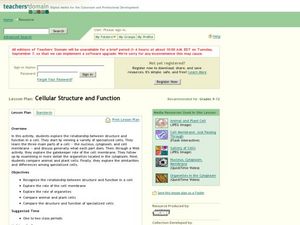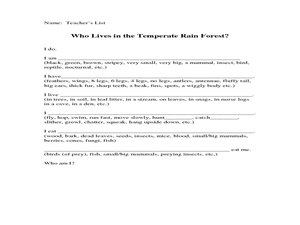Curated OER
Out of the Deep
Students observe, describe, and record characteristics of ocean animals (mammals and fish) and sea shells. They conduct an experiment comparing and contrasting sugar water, salt water and fresh water and create a mural of coral reef...
Curated OER
Plant Life Cycle
Fourth graders explore the plant life cycle. They discuss the sequence of events in the life cycle of the plant and illustrate how the life cycle never ends. Students explore the importance of water, sunlight, and nutrients during the...
Curated OER
Population Demographics
Learners explore how life expectancy has been able to increase in recent years. In this population lesson students complete several activities and create a graph.
Curated OER
What Is a Pond?
Students identify animals and plants that live in a pond. In this marine biology lesson, students create a chart of animals and plants they think they would see at the pond. Students create a "pond symphony" by imitating the sounds they...
Curated OER
What's in That Cake?
Learners explore the depths of the Gulf of Mexico. In this deep-sea habitat lesson, students construct edible models of deep-sea habitats as they bake cakes that include representations of the habitats and the organisms that live there....
Curated OER
Pond Ecology
Fifth graders examine pond ecology, testing how temperature affects the respiration rate of fish. They collect various living things found at a pond, and identify the animal and plant life discovered. They observe a pond community in an...
Curated OER
Animal Homes
Students explore how an animal's relationship to its habitat affect the animal's survival. They discuss animal habitats and the animal's relationship to that habitat through the food chain, life cycle, community, and balance of nature....
Curated OER
Radioactive Decay
Young scholars explore what radioactive decay is and are able to relate it to the concept of half-life. They are given 100 green beads that represent radioactive atoms and 100 white beads that represent stable, non-radioactive daughter...
Curated OER
Grow Frog Grow
Students begin a KWL chart to determine what they know about frogs. They watch a video and listen to a read aloud of Karen Wallace's Tale of a Tadpole before adding what they now know to the chart. They access the Internet, look at a...
Curated OER
What Is A Plant?
Students explore plants. In this plant lesson, students examine organisms to determine which are plants. During this introductory lesson, students explore characteristics of living things.
Curated OER
What's A Mammal?
Students examine mammals understanding what a mammal is and reviewing the eleven mammal groups. In this science instructional activity, students play a game known as Mystery Mammal Game. Yet, first students research about the mammal and...
Curated OER
The Radish Experiment
First graders grow radishes. In this Science instructional activity, 1st graders observe the growth of radishes in both the light and dark. Students discuss what plants need to live.
Curated OER
Chromosomes
Students study chromosomes and how molecular half life affects them. In this chromosome lesson students complete several lab activities on calculating half life, and cracking alkanes.
Curated OER
Larva and Adult Antlion Body Parts
Students identify the major body segments of antlions. Through the use of diagram worksheets, students label the various body parts of the antlion. They review the life cycle of antlions from the larva stage to adult. Several activities...
Curated OER
work in pairs for the activities of this lesson which include researching and identifying butterflies, writing, and a brief oral presentation.
Students explore the concepts of rdioactive decay and dating. They generate a radioactive decay table, use their data to plot a decay graph, develop the concept of half-life, and then use the graph to find the age of a mummified seal in...
Curated OER
Cell Study
Learners (females) are introduced to the cell. They discuss what a cell is, and students define what a cell is. Learners comprehend that all living things are made up of cells. They comprehend that life is defined as something that...
Curated OER
I Can Preserve My Planet
Students explore renewable and nonrenewable resources. In this ocean preservation lesson, students use KWL charts to understand ways the ocean is important to our daily lives. Students create a poster or wirte a letter to someone...
Curated OER
Is This a House for Hermit Crab?
First graders identify text that uses sequence or other logical order. They identify and interpret how different plants and animals inhabit different kinds of environments and have external features that help them thrive in different...
Curated OER
What Makes a Cat a Cat?
Students investigate the lives of pets by videotaping them. In this animal life lesson, students videotape a cat and other pets using school cameras in a computer lab. Students review the footage from the cat and other...
Curated OER
Cellular Structure And Function
Middle schoolers explore the structure and function of the cell. They begin by identifying the cell as the common unit of life in all living organisms, large and small. They examine single-celled organisms and how they carry out...
Curated OER
Layers of the Forest
Learners explore rain forests. In this rain forest ecosystems lesson, students identify and describe the layers of the rain forest. Learners paint and decorate a large rain forest mural. Students write riddles about animals that...
Curated OER
DNA Extraction From Living Things
Students extract DNA from split peas. In this biology lesson, students hypothesize what DNA looks like and perform the experiment to verify their hypothesis. They explain the importance of DNA in living things.
Virginia Department of Education
Prokaryotes
Lead your biology class on a cell-sized adventure! Emerging scientists construct models of prokaryotes, then design an experiment to properly grow a bacterial culture. They conclude the activity by viewing the culture under a microscope....
Virginia Department of Education
A Designed Organism
How can you encourage pupils to demonstrate creativity while still meeting the objective of applying technical knowledge? This activity is your answer! Scientists will create an imaginary creature and prepare a graphic organizer with...























